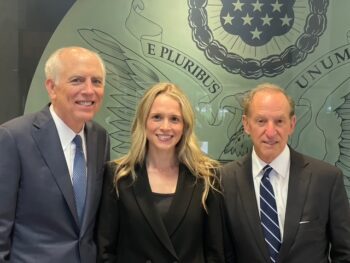The responses were filed July 2, after some families last month urged U.S. District Judge Reed O’Connor to deny the motion to dismiss the government’s criminal fraud case against Boeing and appoint a special prosecutor to take over. The government sued Boeing in January 2021 in the wake of two plane crashes in 2018 and 2019 that killed 346 people.
Legislation Lowers Threshold Amount, Expands Jurisdiction of Business Court
In a few months, cases filed prior to Sept. 1, or before the business courts opened, can be transferred to the courts. Additionally, cases with $5 million in controversy can be filed in the business courts. Filings are expected to increase due to these changes.
Litigation Roundup: Fifth Circuit Slashes FTC’s $37.5M Win
In this edition of Litigation Roundup, the Federal Trade Commission sees a $37.5 million judgment in its favor trimmed down to $12.2 million by the U.S. Court of Appeals for the Fifth Circuit, and the Second Court of Appeals in Fort Worth sides with a landowner in a condemnation dispute involving golf course operations.
Former TV News Anchor Guilty in $300M Pandemic Loan Scam
Stephanie Hockridge and her husband, Nathan Reis, were indicted on federal fraud charges in connection with their efforts to help small businesses obtain forgivable loans under the Paycheck Protection Program. Tried before U.S. District Judge Reed O’Connor in Fort Worth, Hockridge was convicted of conspiracy Friday. Reis is scheduled for trial in August.
Victims’ Families Urge Rejection of Boeing 737 Max Settlement, Request Special Prosecutor
The families’ request was lodged Wednesday in the criminal fraud case the government brought against Boeing in January 2021 in the wake of two plane crashes in 2018 and 2019 that killed 346 people. The families filed their briefs after the government, on May 29, filed a motion to dismiss and informed the court it had entered a non-prosecution agreement with the aerospace manufacturing company.

Anatomy of an Acquittal — Delayed Vindication
At the very end of the series Mad Men, the yoga instructor encourages his class, which includes the show’s protagonist, Don Draper, with the following words: “A new day. New ideas. A new you.” From the perspective of the defense team at least, that’s a fitting introduction to the retrial of United States v. Hamilton, which resulted last week in an acquittal on all charges of conspiracy to commit bribery and two substantive counts of bribery. In the retrial, the government tried precisely the same case it tried four years ago. And why not? That case resulted in a conviction on three of four charges, which led to an eight-year prison sentence imposed by the district court.

Thousands of Texas Hemp Jobs at Risk as State Legislature Passes THC Ban
Thousands of Texas hemp retailers and their employees face looming legal and financial uncertainty after lawmakers approved a sweeping ban on psychoactive THC products, including popular delta-8 and delta-9 edibles, vapes and beverages. Gov. Greg Abbott has stayed neutral on the issue, declining to say whether he plans to use his veto pen or let the bill become law by the June 22 deadline. (Photo by Jim Vertuno/The Associated Press)
Trial Commences in Alleged $300M Wire Fraud Scheme
Opening statements began in the trial against one fintech founder Thursday morning. Stephanie Hockridge was federally indicted in 2024 for allegedly committing wire fraud through a Paycheck Protection Program fraud scheme.

Legislation Aims to Boost Texas as a Friendly Place to Incorporate and Settle Disputes
A new law makes it more difficult for shareholders to challenge corporate decisions through litigation. A second bill headed to the governor’s desk would enhance the fledgling Texas Business Court’s authority, although lawmakers decided for now against expanding the system to rural Texas. (Photo by Ricardo Garza)

What Two Former Texas U.S. Attorney’s Office Heads Want Business Leaders to Know About DOJ Corporate Enforcement in 2025
The C-suite crowd seems to be letting out a collective sigh of relief at the dawn of a perceived era of decreased enforcement, while compliance officers worry aloud about their businesses moving resources to other parts of the company and letting up on their carefully cultivated “cultures of compliance.” We read the room differently, and we thought it important to share seven reasons why there has never been a more important time to keep your compliance frameworks in place and, if possible, provide even more resources to them.
- Go to page 1
- Go to page 2
- Go to page 3
- Interim pages omitted …
- Go to page 44
- Go to Next Page »
